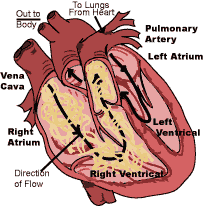|
Printable Page | Home Page | Whitneys Services | Back
Dictionary of Terms | Heartworm Disease in Dogs | Heartworm Life Cycle
What is Heartworm disease in cats?
by Dr. N.J.Hayes, DVM
Symptoms & Diagnosis | Treatment | Prevention
Heartworm is a mosquito borne parasite. The parasite Dirofilaria immitis is transmitted through mosquito bites to dogs and, occasionally, cats. Because the disease is borne by mosquitoes, it is very common in areas where mosquitoes are found. This is especially true in the southern states, such as Florida and the gulf area, as well as the Midwest and Mississippi valley areas. Typically it affects dogs; however in rare cases cats can also be affected.
On average three to 10% of outdoor cats will be affected by heartworm. In most cases heartworm is asymptomatic in cats (without symptoms); however, it can be serious and even deadly.
How is Heartworm Disease Diagnosed?
Symptoms of heart worm disease in cats are very vague and include:
- coughing
- difficulty breathing
- and vomiting
- Sudden death,without symptoms, is commonly seen.

It is difficult to test for heartworm in cats as they typically have low worm burdens - (less than five worms in the heart). This makes it difficult for common tests to pick up the antigen necessary to diagnose the disease.
What is the treatment?
Treatment of heartworm in cats is frequently deadly as well. The medications used to commonly treat heartworm in dogs, have severe side effects in cats. The mortality rate of treatment should be expected to be nearly 30%.
Is there a way to keep my cat from getting Heartworm Disease?
Monthly heartworm preventatives commonly used in dogs can be used in cats as well. These are oral medications and are given once a month as directed. Our hospital recommends Interceptor™.
The monthly pill prevents the microfilaria from becoming adults. Because they work only on that stage of the life cycle, it is important that they be given in a timely fashion. If you miss pills, your cat could become infected with heartworm. For this reason, even cats maintained on the pills year-round should be tested every other year.
For further information about the life stages of heartworm, you might want to read This passage in our Dog heartworm handout.
If you are concerned that your cat may be susceptible to heartworm disease, please contact your veterinarian for further discussion and recommendations. We will be happy to answer all of your questions. Please call 685-4707..
References:
- Tilley, LP, Smith, FWK, The 5 Minute Veterinary Consult, Canine and Feline. 2003, Williams & Wilkins.
- University of Florida IFAS Extension - http://edis.ifas.ufl.edu/
- University of Rutgers Extension - http://www.rci.rutgers.edu/~insects/hartw.htm
| 
